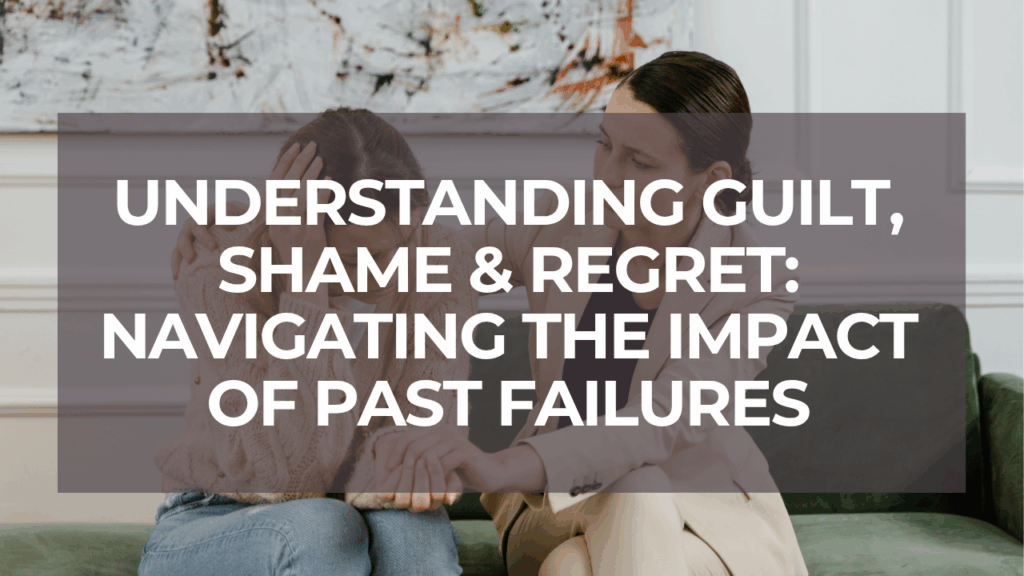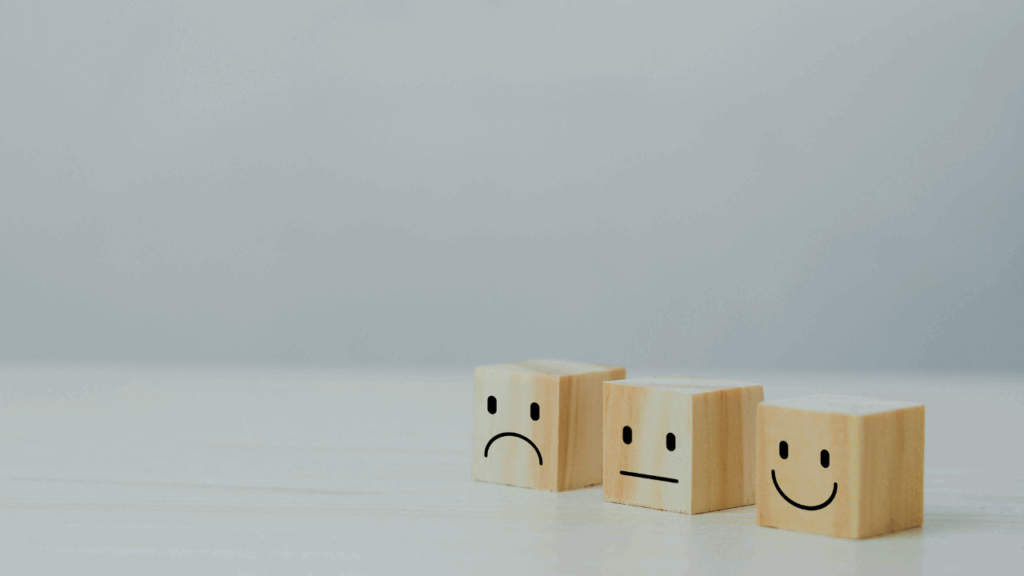Understanding Guilt, Shame & Regret: Navigating the Impact of Past Failures
- Rick J Petronella PhD
- Jun, 10, 2025
- Newsletter
- No Comments
Dr. Rick Petronella

Understanding Guilt, Shame & Regret: Navigating the Impact of Past Failures
However, it is essential to understand that these emotions, while painful, are a part of the human experience. The good news is that it is entirely possible to move beyond them and cultivate a healthier, more forgiving mindset.
It is not uncommon for many of us to carry the weight of past failures within our hearts and minds during life’s journey. We all navigate through life carrying experiences that can weigh heavily on our hearts. Regret can often become a shadow that looms over our present, fostering feelings of guilt and shame that inhibit our joy and peace of mind. The feelings of guilt and shame associated with these experiences can cast long shadows over one’s self-esteem and emotional well-being. It is essential to recognize how these emotions manifest and how they can impact parenting and our personal growth.
Guilt often stems from the belief that one has done something wrong or failed to meet certain expectations. This might relate to moments when they feel they have made choices they wish they could take back. On the other hand, shame is a more profound emotion that revolves around the perception of oneself as unworthy or inadequate. This distinction is vital, as guilt can sometimes serve as a catalyst for positive change, encouraging self-reflection and growth, whereas shame often leads to withdrawal and avoidance.

Research suggests that unresolved guilt and shame from past failures can hinder one’s ability to engage fully with present circumstances. When we are preoccupied with our past, we may struggle to connect with people in our lives, missing precious moments and opportunities to cultivate strong relationships. Children are particularly sensitive to their parents’ emotional states; thus, lingering guilt or shame can create an environment that feels tense or unwelcoming, ultimately affecting the child’s emotional development.

It is also important to understand how societal pressures contribute to these feelings. Modern society is often dissected and analyzed through a myriad of lenses—social media, peer comparisons, and cultural standards—all of which can amplify feelings of inadequacy. Individuals may find themselves trapped in a cycle of self-criticism, which can foster a narrative of failure that is both persistent and detrimental.
It’s so important to face these feelings with kindness and understanding. Remember, acknowledging past mistakes doesn’t determine your worth; it’s more like an invitation to grow and learn! When we nurture self-compassion, we can truly start to break free from the cycle of guilt and shame, reminding ourselves that we’re not alone in our journey. Sharing our experiences with trusted friends and seeking support from professionals can offer wonderful insight and encouragement along the way!

As we navigate our journey, it can be helpful to reframe past failures as opportunities for growth rather than defining moments. Reflecting on what those experiences taught us can empower us to cultivate resilience, not just within ourselves but also within our children. This shift in perspective can create a more nurturing environment where both parents and our children can embrace mistakes as a natural part of life’s learning process.
Embracing Forgiveness: A Guide to Overcoming Regrets, Guilt, and Shame
Acknowledge and Reflect
The first step in overcoming regret is to acknowledge its presence. Often, individuals may feel tempted to gloss over past mistakes or bury their emotions deep down. Instead, taking the time to reflect on those moments can provide clarity. What specific actions or decisions give rise to regret? Understanding the root cause allows individuals to explore their feelings and recognize patterns in their decision-making processes.
Practice Self-Compassion
Regret is often accompanied by guilt and shame, which can be debilitating. Practicing self-compassion is crucial in these instances. It is important for individuals to recognize that everyone makes mistakes; this is an inherent part of being human. By treating oneself with kindness and understanding, guilt can slowly be transformed into an opportunity for growth. Encourage readers to speak to themselves as they would to a friend—offering forgiveness rather than blame.
Reframe Thoughts
Cognitive reframing is a powerful tool for managing guilt and shame. Instead of viewing past actions through a lens of failure, individuals can choose to see these experiences as opportunities for learning and development. By identifying the lessons gleaned from past decisions, they can shift their focus from regret to empowerment. What insights can be applied moving forward to foster healthier choices?
About Letting Go
Letting go of past regrets does not mean forgetting what has occurred or condoning harmful behavior. Instead, it involves releasing the emotional burden associated with those memories. Techniques such as mindfulness and meditation can aid in this process by grounding individuals in the present moment, helping them to realize that the past does not define their futu
Seeking Support
Sometimes, the burden of regret can feel overwhelming, and it may be beneficial to seek support from trusted friends, family members, or mental health professionals. Talking through feelings of guilt and shame can create space for healing. There is strength in vulnerability, and sharing one’s struggles can facilitate a deeper connection with others who may share similar experiences.
Moving Forward
Ultimately, the journey to overcome regret and the accompanying guilt and shame is a deeply personal one. By navigating this path with empathy and understanding—both for oneself and for those involved—individuals can emerge stronger, wiser, and more compassionate. It’s a journey of transforming regrets into stepping stones for personal growth, making peace with the past, and embracing the present.
In conclusion, acknowledging the hold guilt and shame may have on one’s life is the first step toward healing. By transforming the narrative around past failures, we can foster an atmosphere of love, acceptance, and growth, essential for our well-being. It is a journey that requires patience and self-kindness, but it ultimately leads to deeper connections and a more fulfilled relationship experience.
In the end, it is essential to remember that everyone is deserving of forgiveness, and that includes oneself. By fostering a mindset that emphasizes growth, reflection, and compassion, individuals can let go of the burdens of guilt and shame, allowing space for joy and fulfillment in their lives.
Psalm 34:4-5 I sought the Lord, and he answered me; he delivered me from all my fears and shame.
QUIZ
Here are 15 true or false quiz questions designed to help you reflect on whether past regrets might continue to influence you.
Are You Bound by Past Regrets?
This quiz is designed to help you reflect on your relationship with past experiences and determine if you are allowing those experiences to influence your present life choices and or your life regrets. It’s important to approach these questions with honesty and an open heart; there is no right or wrong answer, just an opportunity for deeper self-understanding.
1. True or False: I often find myself dwelling on decisions I made in the past.
2. True or False: I believe that my past mistakes define who I am today.
3. True or False: I find it hard to forgive myself for actions I took in previous situations.
4. True or False: When reflecting on my past, I feel a sense of loss or longing for what could have been.
5. True or False: I think about the ‘what ifs’ of my past more often than I would like to admit.
6. True or False: I have learned valuable lessons from my past mistakes that I carry with me.
7. True or False: I sometimes compare my current situation to how things could have been different if I had made different choices.
8. True or False: I regularly remind myself to focus on the present rather than the past.
9. True or False: I believe that everyone makes mistakes, and it’s a normal part of life.
10. True or False: I can distinctively separate my past experiences from my current identity.
11. True or False I feel at peace with the choices I’ve made, even if I don’t always agree with them.
12. True or False: The emotions associated with my past decisions no longer affect my relationships today.
13. True or False: I actively take steps to ensure I don’t repeat past mistakes without feeling burdened.
14. True or False: I believe that reflecting on the past can be useful as a learning tool, not a source of pain.
15. True or False: I feel a sense of hope and possibility for the future, regardless of my past.
After completing the quiz, each person is encouraged to explore their responses further. Those who answered “True” to many of the first eight questions might reflect on their current mindset and relationship with past experiences. Conversely, those who answered “True” to the latter set of questions may feel more liberated from the constraints of their past.
This exercise serves not only as a self-assessment tool but also as a gentle reminder that confronting one’s past with understanding and compassion can pave the way for personal growth and healthier emotional living. Call us if we can assist you.